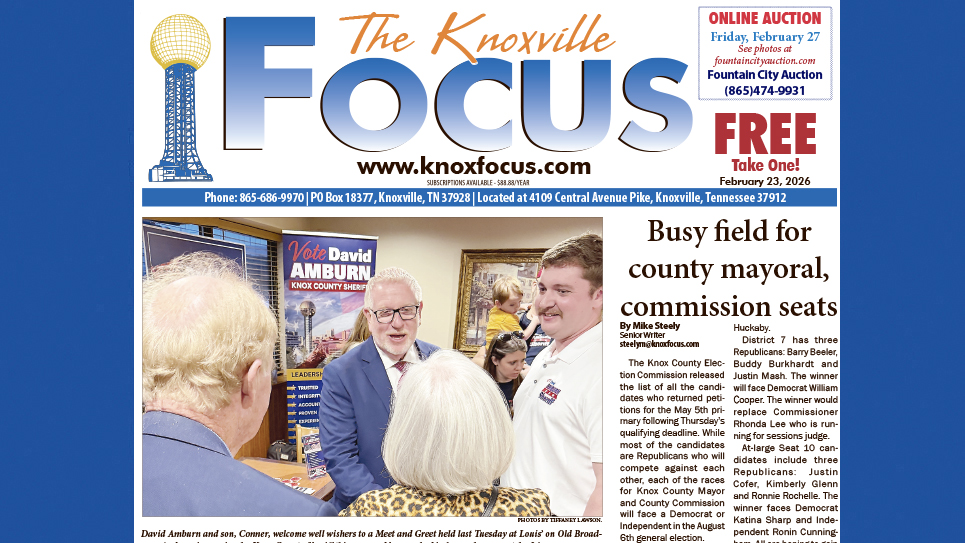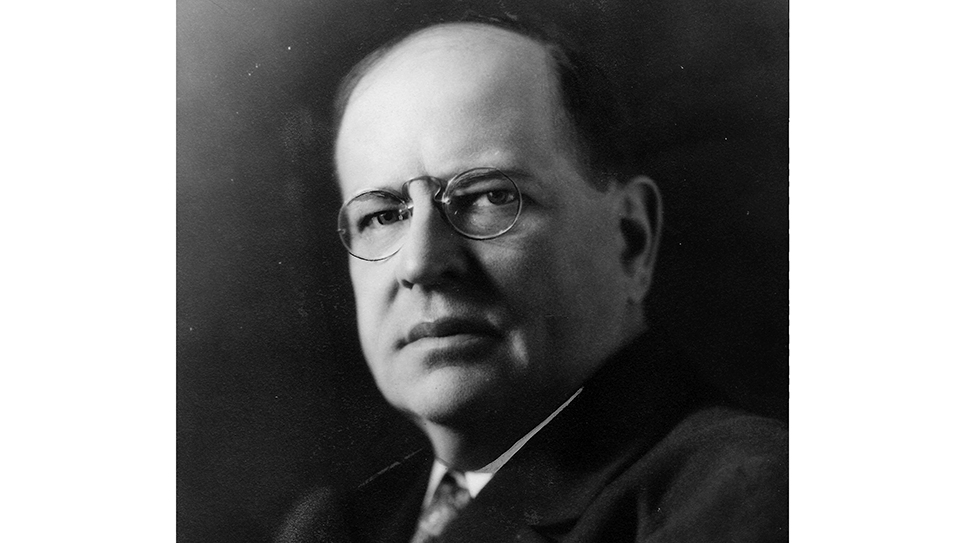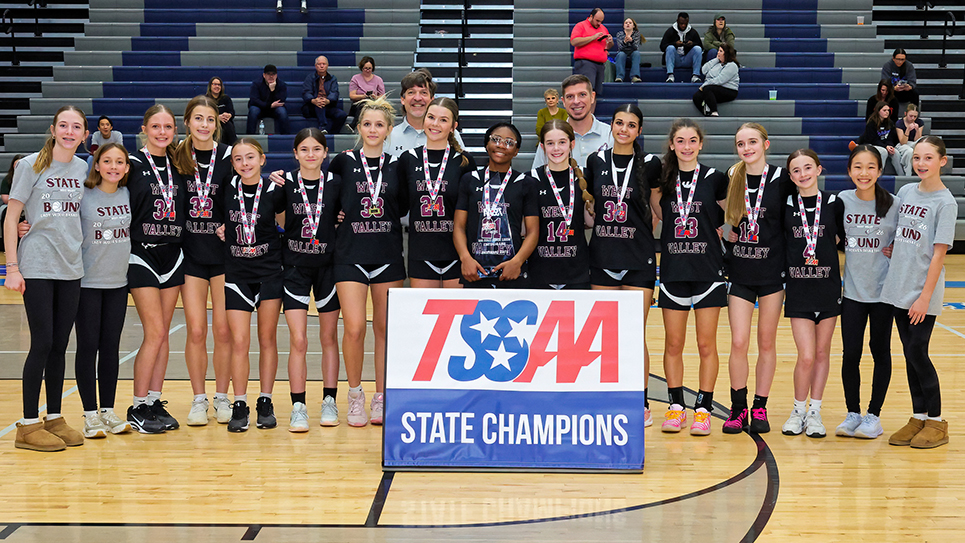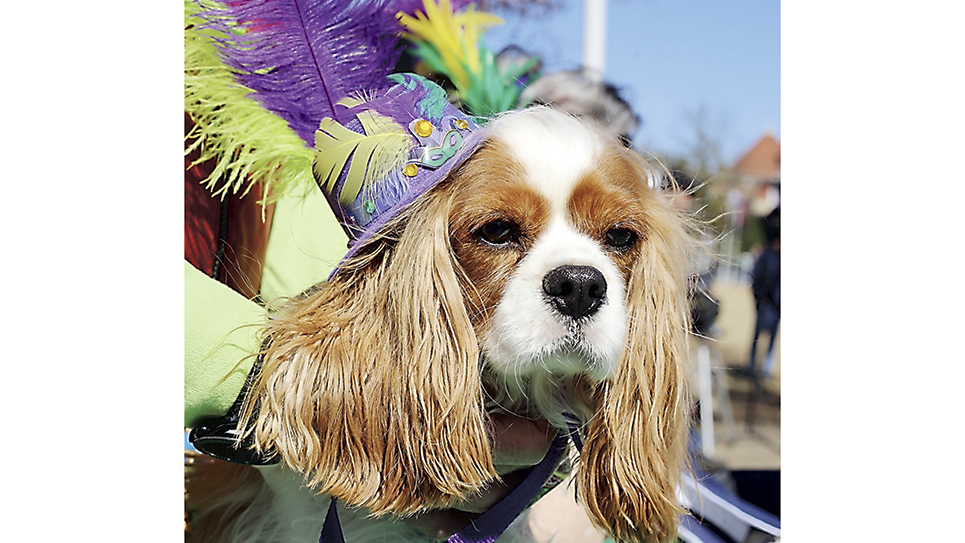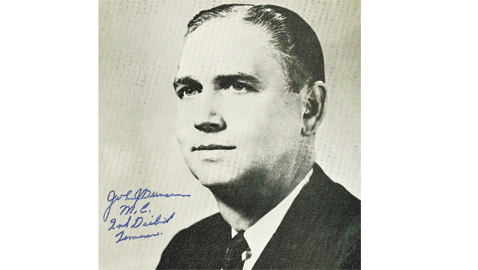
Photo from the author’s personal collection.
Autographed photo of Congressman John J. Duncan, circa 1973.
For two decades there was no politician in the Second Congressional district more popular than John James Duncan.
John Duncan had hitchhiked to Knoxville with five dollars in his pocket to attend the University of Tennessee and remained, rising to become Law Director and Mayor of Knoxville and eventually won a seat in Congress.
Born on March 14, 1919, John Duncan was one of ten children born to Flem and Cassie Duncan in Huntsville, Tennessee. Huntsville was also home to future Congressman Howard H. Baker, as well as Senator Howard H. Baker, Jr. Young John Duncan was taught there was nothing more important than hard work and he lived by that throughout his life. Duncan won a $25 scholarship awarded by Sears-Roebuck and attended the University of Tennessee. Like many others of his generation, John Duncan’s education was interrupted by World War II. Duncan was part of what author David Halberstam referred to as “the greatest generation” of this country’s history. John Duncan served in the United States Army from 1942 through 1945. After the war ended, Duncan came home to Tennessee, enrolled in law school and graduated in 1948.
John Duncan had a job waiting for him, having been hired as an assistant attorney general. Duncan became politically active and was a strong supporter of fellow Huntsville native Congressman Howard Baker. When Knoxville Mayor Jack Dance died suddenly in 1959, John J. Duncan was elected to succeed him.
John Duncan was neither flamboyant nor one to seek publicity. Mayor Duncan approached his work quietly and methodically. Few remember today just how important that particular approach was, especially with much of the change occurring during the turbulent decade of the 1960s. Like many other cities across the country, Knoxville faced demonstrations and sit-in protests. Mayor Duncan worked with protesters and businessmen to defuse an otherwise tense and possibly explosive situation to help bring about peaceful integration in Knoxville. One reason it has been so easy for us to forget is precisely because of John Duncan’s quiet approach and the fact he was successful in easing tensions and bringing about change. Duncan had formed a simply, although appropriately named “Good Will Committee” and secured the cooperation of Knoxville’s Chamber of Commerce. Students from Knoxville College had been staging sit-in demonstrations because some downtown businesses remained segregated. Many African-Americans had been refused service at the lunch counters in downtown Knoxville. Quietly, and with the support of much of Knoxville’s business leadership, Mayor John J. Duncan worked to end the segregation of the lunch counters. It was a difficult issue for the new mayor to face almost immediately upon taking office, but less than a year later anyone could be served and enjoyed the food in downtown Knoxville. The leadership of John J. Duncan is one big reason why Knoxville never experienced the violence that afflicted many other cities throughout the South during that period of time.
As a result, John J. Duncan was extraordinarily popular in Knoxville’s black community throughout his career. Duncan’s reputation in the African-American community was well established before he ever went to Congress. While in Congress, John Duncan kept up a line of communication and open door policy that extended to organizations that did not necessarily agree with his positions on issues, such as the NAACP and ultra environmentalists.
It was also John Duncan who pushed to renovate Knoxville’s Market Square. Some objected to the notion of demolishing the old Market House, but Mayor Duncan was successful in revamping Market Square, which continues to thrive to this day.
Other changes in Knoxville and the local economy caused problems for its citizenry and Mayor John Duncan. For years one source of employment for thousands of Knoxvillians had been the textile industry. By the early 1960s, many of the textile mills were closing, causing considerable unemployment. Another change was the beginning of businesses beginning to move from the downtown area to West Knoxville. Farmland and pastures in West Knoxville were being developed for business. Mayor Duncan received a setback when he proposed a bond issue to help create a large industrial site and immediately ran into opposition from ultra-conservatives who loathed the notion of government and business working together. Duncan’s proposal went down to defeat in a referendum.
Still, John Duncan was easily reelected mayor in 1963 and that same year Congressman Howard Baker died of a heart attack while shaving. A special election was held and Baker’s son and namesake refused to run, urging his stepmother, Irene B. Baker, to run instead. Mrs. Baker was elected and served a short stint in Congress. The Congressional seat would be up in the 1964 election and John J. Duncan became a candidate in the Republican primary. Duncan faced a serious opponent in the GOP primary in Judge J. Frank Qualls of Roane County. Judge Qualls was a formidable figure and an excellent campaigner. The Second Congressional district in 1964 was composed of nine counties: Anderson, Blount, Campbell, Knox, Loudon, Morgan, Roane, Scott and Union.
It was a hard fought race with four candidates running, although only Duncan and Judge Qualls were serious candidates. The battle for the Republican nomination for Congress came down to the last vote. Duncan carried Campbell, Knox, Loudon, Scott, and Union counties. Judge Qualls won Anderson, Blount, Morgan and Roane counties. John J. Duncan’s final vote total was 23,851 to 22,983 votes for J. Frank Qualls. Duncan won by 868 votes.
The general election that year was more difficult than most, especially in a district that has never elected anything but a Republican since the GOP has appeared on the ballot. On that basis, the Second Congressional district of Tennessee is the most Republican district in the country. Mayor Duncan faced Willard Yarborough, a reporter for the Knoxville News-Sentinel and a member of the Knox County Quarterly Court, the forerunner of the Knox County Commission. Republicans were handicapped that year by the candidacy of Arizona Senator Barry Goldwater, who proposed selling TVA to private power interests, a notion that appalled tens of thousands of Tennesseans. Howard Baker was running for the United States Senate to fill the remainder of the term of the late Senator Estes Kefauver and Memphis businessman Dan Kuykendall was running against Senator Albert Gore for a full six-year term. Both lost and John J. Duncan won a narrow race over Willard Yarborough. Never again would John Duncan be hard pressed to win another election for the remainder of his life.
Once in Washington, Congressman Duncan settled in and followed the example set by several other Tennessee Congressional institutions who stressed constituent service. Senator Kenneth McKellar had served six terms in the United States Senate and his office was legendary for going to extraordinary lengths to be helpful to the people of Tennessee. First District Congressman B. Carroll Reece had also excelled in constituent service, as did his successor in office, James “Jimmy” Quillen. Congressman Quillen arrived in Washington just two years before Duncan and Congressman Duncan became an institution in his own district precisely because of his dedication to providing excellent service to his constituents. I distinctly remember several occasions when Congressman Duncan made simple talks, never failing to remind folks he was happy to help anyone and everyone, “Republican, Democrat and Independent”. He was true to his word and while in Knoxville, Duncan regularly held office hours in the old federal building and the lines would frequently trail down the hall. Congressman Duncan saw them all and worked hard to resolve whatever problem each individual had.
John Duncan’s quiet approach to his work was recognized by his colleagues and he was given a place on the most powerful of Congressional committees: the Ways and Means Committee. The only committee in Congress specifically charged with writing tax law, Duncan was one of the most senior Republicans in Congress by the time of his death.
When Richard Nixon slowly reemerged from the ashes of a once bright political career, following his loss of the presidency to John F. Kennedy in a very close election and his disastrous campaign for governor of California in 1962, the former vice president began campaigning all across the country for GOP candidates in anticipation of another presidential bid in 1968. Congressman John J. Duncan was one of the first Republicans in Congress to endorse Nixon’s candidacy, almost a year before the election.
Nixon carried Tennessee in 1968 and by 1970, the Volunteer State GOP was enjoying a significant revival. Winfield Dunn was elected governor and Congressman Bill Brock defeated Tennessee’s “Old Gray Fox,” Senator Albert Gore. By 1973, Republicans held a majority of the seats in Tennessee’s Congressional delegation. It did not last.
Ray Blanton reclaimed the governorship for the Democrats in 1974 and Congressmen Dan Kuykendall and LaMar Baker were defeated. In 1976, Senator Brock lost to Jim Sasser. Yet in Tennessee’s Second Congressional district, Congressman John J. Duncan remained unbeatable.
1976 was an excellent year for Democrats in Tennessee and Jimmy Carter was hugely popular in the Volunteer State. Many may not wish to recall it now, but Tennessee would be Carter’s best state in the nation after his home state of Georgia. Democrats thought they might have an opportunity to unseat Congressman John Duncan. The Democrats nominated an especially able and attractive candidate in State Representative Mike Rowland. Rowland was young, handsome, and articulate. I remember very well spending a great deal of time with Congressman Duncan that year, as I worked in his campaign. I found myself traveling throughout much of the Second district. Congressman Duncan’s conversation while a driver drove us to our destination was a political education. Congressman Duncan took nothing for granted and privately admitted Rowland was an excellent candidate and he felt sure the Democrats would do well in Tennessee that year.
Congressman Duncan always had a booth at the fairgrounds and gave away free ice water. The Congressman would mix and mingle with the crowds and occasionally jot down something for an anxious constituent. Congressman Duncan once told me as we were riding to Blount County, “I’ve thought about retiring, but then I lie down for a while and it passes.”
Mike Rowland’s campaign was well financed and he had billboards throughout the district and ran television ads. Congressman Duncan responded with billboards of his own, cleverly designed and highly effective. They featured Congressman Duncan at the center, surrounded by people of all walks of life. The billboards were headlined, “People for Duncan.”
While Jim Sasser and Jimmy Carter were carrying Tennessee, John Duncan crushed Mike Rowland.
Congressman Duncan returned to Washington and at that time, still retained people on his staff who had worked for his predecessor, Congressman Howard Baker, Sr. Congressman Duncan then faced an issue, which is well remembered to this day. The Tennessee Valley Authority was completing the construction of the Tellico Dam and someone discovered the snail darter and some environmentalists began raising hell about it. Congressman Duncan made several efforts to amend the Endangered Species Act, but was unsuccessful. John Duncan finally attached a rider to an appropriations bill, which not only passed the U. S. Senate, but was signed into law by the president. TVA was able to complete the dam and it was soon discovered the snail darter lived well beyond the borders of Tennessee.
Congressman John J. Duncan served throughout the administration of President Ronald Reagan and remained one of the more senior Republicans in Congress. Irrespective of his own importance in Washington, he remained modest, entirely approachable, and kindly.
It really isn’t possible to write about John Duncan without a word about his wife, Lois. Lois Duncan was originally from Iowa and simply put, she was a grand lady. Always nicely coiffed and quite well dressed when out campaigning with her husband, privately Mrs. Duncan was lively, talkative, highly intelligent and just plain fun. I remember Lois Duncan and I having a spritely conversation and she said something that caught Congressman Duncan’s attention. She promptly told him he wasn’t a part of that particular conversation. Lois Duncan was a very gracious lady and for those of us who had interned in Congressman Duncan’s Washington office, she remained exceedingly warm and kind. Mrs. Duncan was already ready with a hug and a kind comment about “our boys”. I once told Congressman Jimmy Duncan he had won the parent lottery and he laughed and admitted he would be the first to agree.
Congressman John Duncan’s long career came to an end when he passed away on June 21, 1988. Congressman Duncan was profoundly and deeply mourned by many thousands of his constituents for his long service and many kindnesses.
Lois Duncan outlived her husband for some years, but remained ever ready to visit and perform her own kindnesses for her family and friends right up until her own death.
John and Lois Duncan were simple people, bedrock Americans from “the greatest generation” who believed in hard work and doing for others. They made a good life for themselves and their children, but they made the lives of thousands of others better, too.

